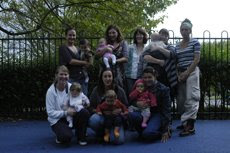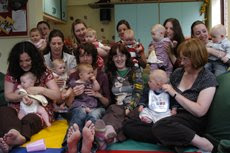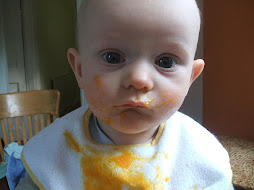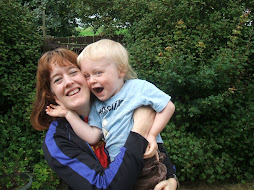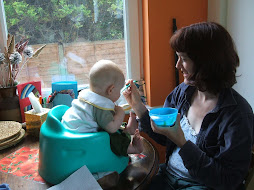Thursday, 28 June 2012
Is My Body Too Bootylicious For You, Baby?
Monday, 2 April 2012
Enough Already
In the last eight months there have been three diatribes about mothers in the ‘Family’ section of the Guardian, which I find disheartening and a bit baffling (why alienate your target readership?). They have all come from childless women in their forties. Last summer’s self-congratulatory twaddle from Emma Kennedy portrayed mothers as deluded and insensitive. Then ‘I’m Not a Mother, but I’m Still a Person’ – gentler in tone, but implying no mother was capable of showing interest in anything except motherhood/children. And now Lynch’s demolition job ‘Mothers, stop moaning!’ Between them they assume all mothers are vacuous, ungrateful and self-obsessed.
‘I don’t want to mum-bash’, claims Bibi Lynch. Why then, open your article with two stories about mothers who anyone, even other mums, would find ridiculous…? That of the ‘devastated’ about-to-be-mother of three boys and how tired Victoria Beckham is, despite her undoubted fleet of staff and luxurious lifestyle.
She then slips in a sideswipe at Mumsnet Towers, assuming all women who have procreated, worship at its feet, instead of finding it often cloyingly self-righteous and clique-y, as organisations run by women can tend to be. However, if moaning mothers annoy you, why look at Mumsnet? It’s like saying you hate origami and getting all aerated because Peter from Swanage can’t fold the perfect swan on origami.co.uk.
Lynch claims she knows how horrendous post-natal depression is, or illness as it is technically termed. Depression is depression, yes, but does she know that according to the Royal College of Obstetricians and Gynaecologists (RCOG), more than ten per cent of maternal deaths - that's deaths within one year of giving birth - are caused by suicide? And often particularly grisly suicides at that, the women wanting to punish themselves in the worst way possible for leaving their child motherless.
Mothers are treated as superior citizens, she says. As anyone who has battled with a baby in a busy place will tell you, this is not always the case. People tend to look the other way and tut when a noisy baby and harassed mother cross their path. She was asked to get off a bus for a mother with a pram. Yes, that’s not fair. Perhaps the woman might have been someone like me, who had cried every day since giving birth four months earlier and was in desperate search of a group that recognised I was still a person behind the mother. I had to get two buses to this group with a new pram (the inherited one had collapsed) which I hadn’t, in my agitated state, learned how to deal with. The crowded bus watched as I tried to fold it with one arm, the other holding the baby, before admitting defeat and leaving the bus. Half an hour’s walk later, upset and very late for the group, I phoned my partner on the second bus, and didn’t put the phone away properly. It was stolen. I didn’t make it to the group.
In the majority of cases, depression in new mothers does decrease and of course, they have the immense gift of that baby, but to suggest that they should have no further sadness, anger or boredom in their lives, just because they are mothers, is preposterous. I run a creative support network in Brighton called Mothers Uncovered. The women that participate are bursting with love and gratitude, but they are also struggling to find their way as mothers. And before you say it, they are not pampered middle class brats. They come from all walks of life.
Lynch dwells romantically on how mothers and their offspring belong to each other. This is a wonderful thing, but the very many cases of estrangements within families belies this as a universal truth. Or what about the mothers of murderers, of rapists, or the case of the boy in the news this week who killed his mother with a hammer? Were they glad they were mothers?
‘I will never be loved as you’re loved’, she mourns. Well, let this ‘moaning’ mother tell you: one of the bittersweet truths you come to realise is that your love for your child is greater than they will ever have for you. While your child is still young, it is reciprocated in equal measure. But the child must grow, move away from the nest, fall in love with others, perhaps have a child of their own. If they do, they will feel for that child what you felt for them. There may be a renewed closeness when that point is reached, but the intensity of motherly love is a one-way street.
Saturday, 18 February 2012
Where have all the real mums gone…?
I saw a picture of Amanda Holden this morning arriving at a Britain’s Got Talent audition. ‘Less than a month after giving birth to her daughter’ trumpeted the paper, ‘and after having been in intensive care, here she is “radiant” in blue silk dress by blah blah blah…’
And so on. There is the picture of her looking radiant, as promised. Her stomach is as flat as a young girl’s. Perhaps she’s been photo-shopped. Perhaps not. It doesn’t really matter when this is all we see. Women who give birth at the age of nearly 41 and spend time in intensive care should not look like this a few weeks later. As soon as she was released from hospital she must have been on a hardcore diet and exercise regime.
And for what…? To show that she is still worthy of her crown as ‘Woman who Cries on Judging Panel’. She knows she must look perfect, every moment she is not in her own house, because if she allows it to slip, for even a second, there’s several hungry up and coming starlets desperate to be in her shoes.
Was it always this bad? Women have always been judged more on their appearance, rather than their ideas or accomplishments, this is not new. Are they not allowed to let real life show, even for a day or two…?
When I run Mothers Uncovered workshops, I ask participants to name mothers in the public eye that might be considered role models. There is always a thoughtful silence as they cast their mind over the various actresses, presenters, singers etc and concede that none of these women are shown mothering. Even when they are in their 43 page ‘Hello!’ feature special, everything is perfect, everything is manufactured.
This maybe would not matter, if it weren’t for the fact that the 99% of mothers who are not in the public eye feel inadequate next to these airbrushed lovelies. They feel fat, messy, exhausted, irritable, emotional. They ache all over. They wonder if they’ll ever be anything beyond ‘mum’ again.
Where have all the real mums gone…?
Saturday, 7 January 2012
Mums 'R' Us! (Or not)
Opening my Guardian guide this morning I read with the usual sinking sense of inevitability that ‘How to be a Good Mother with Sharon Horgan’ was not going to be an insightful, thoughtful documentary. Rather it was going to be the usual ‘Point your Finger at the Freak’ style of programme. Because that’s all we want these days, isn’t it..? Heaven forbid we might see ordinary people going about their lives. How deathly dull!
The fact that most of the population, except for new mothers, doesn’t actually know what life is like for new mothers, is neither here nor there. Instead we’ve got this to marvel at!
Lynnea worships the placenta and turns other people’s into edible capsules for them; while Daria does not believe in nappies, or any detachment at all from her toddler.’ (The Guardian 7/1/12)
So, this is ‘Knock the Hippies Week!’ Next week will probably be ‘Knock the Trailer Trash!’ and the last ‘Knock the Pushy Career Mums!’ I realise this programme hasn’t aired yet, but this doesn’t fill me with confidence.
So, here’s a plan, thought the programme-makers. Let’s pick the most extreme example, so that anyone who practises attachment parenting/alternative methods (the first episode) will be made to feel ashamed of their choices. Who cares when we can have a good laugh? Indeed, the Guardian points this out for us: ‘It’s a fascinating look at the insanity of parenthood, which strikes just the right tone between the audience’s hooting and Horgan’s own mildly incredulous line of enquiry.’
I have to confess a personal interest in this. In March last year, I was forwarded an email from a friend who runs a music group for toddlers. She had been approached by the television company and thought I, as the director of Mothers Uncovered, might be interested in getting involved. Their intention was to make a documentary that was:
‘a celebratory look at women who love being mums and who are very focused on bringing up their children the best way possible.’
(Doesn’t seem much celebration if we are ‘hooting’ at them.)
I spoke to one of the production team, saying that I was keen to share my views on motherhood and perhaps other members of Mothers Uncovered might feel the same, but that I didn’t want myself or the group to be edited or presented in such a way as to mock us. There was a slightly uneasy tone to her voice as she ended the call as quickly as possible. Needless to say I wasn’t chosen, thankfully.
The reason I say people are unaware what life is like for new mothers, is because when you are a new mother, you withdraw from the world, for a short or longer time. When you return to the fray many of those memories and experiences have faded. One of the reasons I created Mothers Uncovered was to give space to those experiences and the chance to capture them, through writing, photography and interviews.
I would love for a respectful film to be made about mothers. We have had such a film made about us by Ceri Whitby http://vimeo.com/23501568. There’s no chance of that, or anything like it, reaching a wider audience as long as we retain our desire for ‘Point and Laugh’ television.




